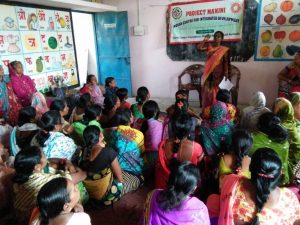Third Sunday of Advent: The Human Rights Situation of Women in India
As we remember the Dominican Month for Peace in India in Advent…
We remember:
Women, who comprise nearly half the population of India, suffer social and economic discrimination and lack of social liberty with a dominant life experience of oppression, restrictions, violence and exploitation.
While they play a vital role in managing the family and contributing to the family economy, their contribution goes unrecognized as they are treated as subservient to males. Deprived of education, equal opportunities for productive expression and political decision-making, largely confined indoors and subjugated relentlessly, women continue to face grave violations of rights.
The persistence of patriarchal social norms and inter and intra gender hierarchies leads to women being exposed to a continuum of violence in the home and in society throughout their life cycle.
2016: 338,954 reported incidences of crime against women. These included:
- 7,628 dowry deaths
- 225 cases of acid attack
- 110,434 reported cases of cruelty by a husband or his relatives
- 1,183 cases of human trafficking
- 39,068 rape cases
- 39,953 cases of assault on women
- 27,422 sexual harassment (National Crime Records Bureau)
Census 2011:
Literacy rate for men = 82.14%; for women = 65.46%
2011-12 National Service Scheme: Participation rate of women in employment was less than half that of men.
Urban: 54.6% men; 14.7% women
Rural: 54.3% men; 24.8% women
2014: Women representation in the Lower House of Parliament was 11.9% and 11.4% in the Upper House.
Human trafficking in India, although illegal under Indian law, remains a significant problem. Women and girls are trafficked within the country for the purposes of commercial sexual exploitation and forced marriage, especially in those areas where the sex ratio is highly skewed in favor of men. Men and boys are trafficked for the purposes of labor, and may be sexually exploited by traffickers to serve as gigolos, massage experts, escorts, etc. A significant portion of children are subjected to forced labor as factory workers, domestic servants, beggars, and agriculture workers.
 Women in disadvantaged situations are being empowered to challenge gender violence and exploitation and to insist on gender equality and more political participation. This is done through the formation and facilitation of women’s groups, socio- legal training, skills building and assistance in acquiring livelihood opportunities, along with the facilitation of dialogue in families and communities.
Women in disadvantaged situations are being empowered to challenge gender violence and exploitation and to insist on gender equality and more political participation. This is done through the formation and facilitation of women’s groups, socio- legal training, skills building and assistance in acquiring livelihood opportunities, along with the facilitation of dialogue in families and communities.
- For more information on an example of Dominican ministry on women’s rights in India read about the Urja women’s empowerment program: https://icid.org.in/our-programs/manini/
To show solidarity, Dominicans worldwide are urged to act and pray.
- Pray each day for the Dominican Family in India and for the people who suffer and those who work to alleviate their pain, especially:
- For women and the wisdom, courage, and strength they need to challenge violence and exploitation
- For those who have been trafficked in the past that they find healing and new life in the days to come
- Learn more:
- “Girls Adoption and the Role of Women in Indian Society https://www.youtube.com/watch?v=uBe6xYJyEYw
- “Situation of Women in India” https://www.female-rights.com/india/
Prayer:
Today we hear from the Prophet Isaiah, “Be strong, fear not! Here is your God… comes with vindication; with divine recompense. Then will the eyes of the blind be opened, the ears of the deaf be cleared” (Isaiah 35: 4b – 6a)
As we pray in our third Sunday of Advent for the people of India around the world, may we pray for the way of transformation in India for dignity and respect for women.
 USA
USA


